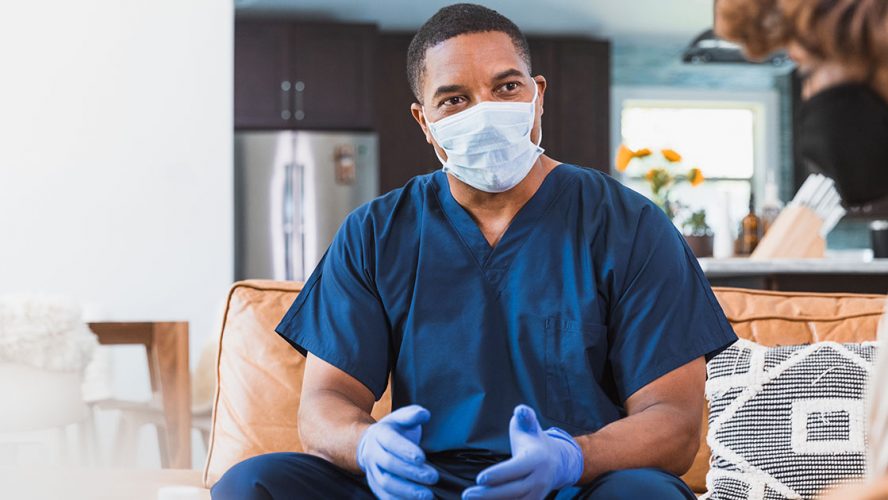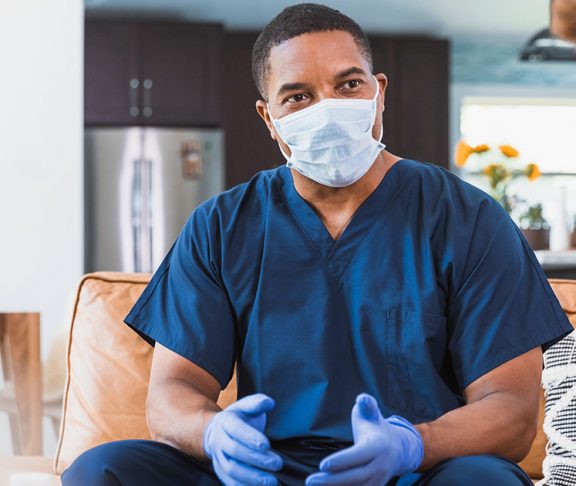Transplant patients need to regularly monitor their health and to have frequent blood tests to monitor the health of their transplanted organs. That’s been challenging during the pandemic.
Normally patients have their blood drawn in-person at a lab or hospital. But many patients worry about doing those tests because they’re immunosuppressed, high-risk, and want to limit their potential exposure to COVID-19.
Now there’s a safer solution for transplant patients to get lab work done during the pandemic: mobile phlebotomy.
“When the COVID-19 pandemic started, CareDx put their heads together and said, ‘transplant patients are terrified to leave their home [for] their routine blood draw monitoring,’” says Dr. Diane Cibrik, the medical director of the kidney pancreas transplant program at the University of Kansas Hospital. “’Why don’t we create a service that comes to their house — a mobile phlebotomy unit?’”
The result is RemoTraC, a remote home-based blood-draw solution using mobile phlebotomy. Trained mobile phlebotomists go to the patient’s home to draw the blood, and both the phlebotomist and the patient wear masks. The solution by CareDx, Inc., a precision medicine company, administers AlloSure and AlloMap transplant surveillance tests, as well as standard monitoring tests.
Patient comfort
“It limits your exposure,” says transplant patient Amanda Merring, who started getting her blood drawn from a mobile phlebotomist during COVID-19. “It limits the risk because the phlebotomist is one person, as opposed to going into a hospital.”
Merring, 32, received a kidney transplant two years ago. She takes medicine twice a day, receives medical infusions every two weeks and gets blood drawn once a month.
The school music teacher lives in Junction City, Kansas — two hours from her transplant doctor, Dr. Cibrik. Pre-pandemic she was getting her lab work done at a local hospital.
The mobile phlebotomist gives her peace of mind and is very convenient, spending about 30 minutes at Merring’s home and drawing blood at her kitchen table.
“It’s a comfort knowing that you don’t have to go into a lab somewhere, wait in line, or try to make sure that everything’s clean, or run into people, as opposed to just doing this in the comfort of your own home, where you feel safe, comfortable, and secure,” she says, calling the service, “a blessing for any transplant patient.”
CareDx is dedicated to transplant patients. Leading with innovation.
Essential tests
Lab tests show how the patient’s body is handling the transplant, including risk of rejection. The tests are critical throughout the process, especially during the first year after transplant. They shouldn’t be skipped or delayed.
“I started employing more and more of RemoTraC and it works really well,” says Dr. Cibrik.
One of her patients, who received a transplant within the past year, lives in Virginia. She had all of her labs taken at home and then the two discussed the results during a virtual appointment.
The service is convenient, especially for patients who don’t live near the hospital or lab. Many of Dr. Cibrik’s patients live in rural areas in Kansas, Missouri, Arkansas, and Oklahoma and would have to travel long distances to get blood drawn.
“They love not having to go to the lab,” she says. “They like the personalized attention. They like being able to have that social distancing and not be with a bunch of other patients in the hospital setting or in the laboratory setting.”
There is no additional cost for patients to use the mobile service.
Support
Through offerings like RemoTraC, CareDx is committed to better outcomes for transplant patients. They encourage patients to work with their doctors to take part in their own health.
The company recently launched AlloCare, a health app available in the App Store, that helps transplant patients manage their health with key biometric tracking, medication reminders, even upcoming lab scheduling. CareDx also hosted its first annual AlloCare Festival, a virtual celebration to honor the organ transplant community and foster deeper connections among the extraordinary individuals and societies who are part of it.
RemoTraC is available to transplant patients who want monitoring lab tests to be drawn from their home. Patients sign up at www.caredx.com/remotrac to see if they qualify, and CareDx will work with their transplant team.


